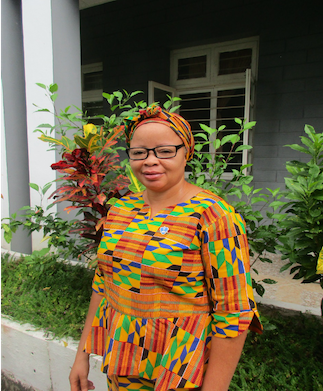Holy Child Sister Gifty Abane is a panelist on The Life, a monthly feature from Global Sisters Report about the unique, challenging and very specific lives of women religious around the world.
In honor of Earth Day on April 22, the columnists responded to the following question:
What is your personal and congregational response to the climate crisis? Have you or your community been involved with action steps around the Laudato Si’ platform?

Gifty Atampoka Abane is a member of the Society of the Holy Child Jesus from Ghana. She is a teacher in a Catholic girls’ high school in Ghana and serves their province in leadership.
The creation story from the book of Genesis places a huge responsibility on humans as co-creators and caretakers of all creatures. However, beyond our quest for survival, our innate desire for accumulation and our wasteful culture has led humanity to a gross abuse of creation. Laudato Si’ challenges our behavior and attitude toward creation and is a call of conscience to “care for our common home,” a noble call for introspection on how much we have contributed in the rape of Earth, our mother.
The extreme climate-related disasters throughout the world increase in severity and frequency, loud enough for us to begin earnestly to salvage the future. But world leaders continue to contribute to the destruction of the Earth by their silence and ineffective laws and policies and skewed, hypocritical regulations.
The Society of the Holy Child Jesus‘ responses to this call are varied and diversified at the individual, community and province levels. In the African Province, there are activities like advocacy programs for youth in parishes and schools and women’s groups on unhealthy practices and their impacts on the environment. Clubs in our schools are integral components in engaging our pupils and students on the care of the environment. Some sisters collaborate with other interest groups in addressing illegal mining, shoreline sand depletion, indiscriminate felling of trees, littering, pollution, bush fires, and waste treatment. Most communities are using solar energy to cut down on their use of electricity from hydropower.
Personally, as a teacher of biology, a subject with an ecological component, at our Holy Child Secondary School, Cape Coast in Ghana, I deliberately incorporate into my lessons the need for healing of the Earth. Perhaps awareness and change in mindset and/or behavior can trigger positive desired attitudes toward the planet. There is no better approach to changing young minds than in the classroom.
Teaching biodiversity, facilitating a sense of pervading harmony and balance, challenges them to adopt a systems model of thinking about our wounded Earth. In one lesson on ecology, an environmental advocacy club — “Global Warming Awareness Club” — sprang up. In the club, a series of activities has brought about some positive behavioral change toward the environment.
In 2020, with the support of the African Faith and Justice Network, about 100 students from two Holy Child schools in Cape Coast, Ghana, and in Lagos, Nigeria, participated in a three-day online workshop on care for the Earth. Since then, the club has planted about 1,000 trees in our school environment; members have written poems and articles on the wise and prudent use of the natural resources; and they are working with the archdiocesan Caritas office to recycle plastic wastes.
Click here to read more responses from women religious on Global Sisters Report.
Related
Some consider the vow of obedience the most difficult. How do you or your community balance the demands of communal discernment with your personal preferences for ministry and living situations?
https://www.globalsistersreport.org/news/our-vow-obedience-we-make-decisions-light-christ


Comments are closed.